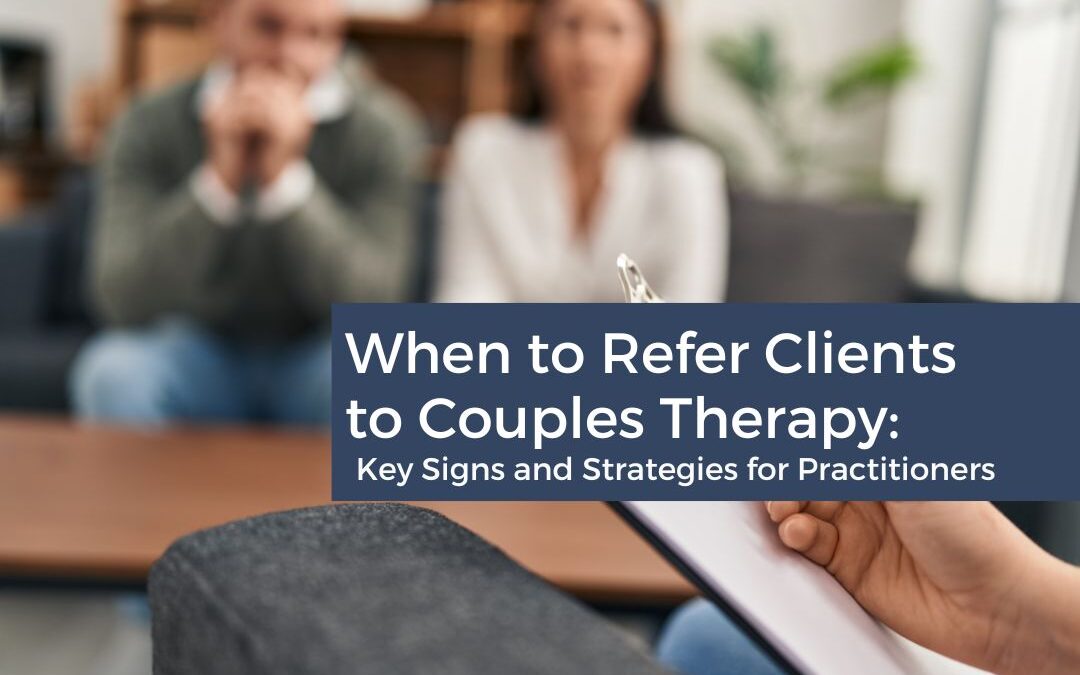For therapists, psychologists, and counsellors, it’s not always straightforward to decide when a client might benefit more from couples therapy rather than individual sessions, or maybe they need both. As the first point of contact, your relationship with the client is very powerful and influential.
They’re looking to you for support and answers. You can’t know everything and you can’t help with everything, it’s natural not to know everything, especially when a client’s concerns seem to straddle personal and relational issues. In these cases, knowing when to refer a client to couples therapy can make a big difference.
So, when does couples therapy become the right option?
Let’s go over some key questions to help gauge whether a referral could be beneficial, along with important life events that often bring couples into therapy.
Signs Your Client Could Benefit from Couples Therapy
One of the first indicators is whether the issue at hand is being discussed openly within the relationship. As I often ask, “How does your partner feel about the issue you’re facing?” If the answer suggests a lack of communication or misunderstanding, it may be a signal for couples therapy. Sometimes, clients struggle to bring up difficult topics, leading to a dynamic where concerns are left unaddressed, which might mean they could benefit from couples counselling.
Another question to consider is, “Do you feel your concerns impacting on your relationship?” Many issues may seem individual, such as work stress or health concerns, but they can still affect the relationship’s overall health. Even if the root issue is personal, couples therapy can offer a supportive space to work through these challenges together. It’s not uncommon for clients to realise that, despite managing well as individuals, even if the relationship’s feeling really good when one partner is struggling, it’s very hard not to bring that into the relationship.
For those who find themselves in repeated patterns of conflict, couples therapy can help break the cycle. A powerful question to ask is, “Do you often find yourself stuck in the same arguments without any resolution?” Persistent conflicts, or the complete absence of conflict, may signal a deeper communication issue. The absence of conflict is not what we want; two brains in a relationship are bound to have some conflict. It’s normal, natural, healthy. Healthy conflict resolution is key, and sometimes individual therapy can’t address these shared dynamics effectively.
Life Events That May Warrant a Referral
Certain life events place unique pressures on relationships. Major transitions like job redundancy, the birth of a child, or a health diagnosis are significant stressors. They can be really big life stresses for people, and couples therapy often offers a supportive environment to navigate these together. Whether it’s a change in physical health, a mental health diagnosis, or fertility challenges, these events impact each partner and the relationship’s stability. Offering a referral to couples therapy during these times can provide both individuals with tools to manage change together.
Key life events to consider:
- Job redundancy or major career changes
- Birth or adoption of a child
- Chronic or terminal health conditions
- Mental health challenges within the relationship
- Fertility issues or miscarriage
- Death or illness of a parent or close family member
- New diagnosis of illness or disability in the family
Choosing the Right Therapist
If you decide that couples therapy is the right choice, finding a qualified therapist with experience in this area is essential. Not all therapists specialise in couples work, so consider someone who has training and certification in a couples therapy model. When looking for a couples therapist, look at that person’s qualifications and see, do they have a specialisation in couples therapy. You may want to consider therapists with training in specific methodologies such as Gottman, EFT, or Imago, which all have unique approaches to relationship work.
Lastly, consider whether the therapist is culturally sensitive and inclusive. Clients may feel more comfortable if the therapist understands their unique context, values, or lifestyle, especially for clients who may be neurodivergent, queer, or part of a minority group. As I often recommend, check in with your referring therapist, the person you’re looking to refer them to, that they also are okay with those things.
The Lasting Impact of Couples Therapy
Referring a couple to therapy isn’t a decision taken lightly, but it can be incredibly beneficial. As a couples therapist myself, I believe everybody can benefit from couples therapy; the skills that you learn about yourself, how you communicate, how your partner communicates, what you get wrong, what you misunderstand, how you’re misunderstood, all of these are really, really helpful skills.
Equipping clients with tools to improve their communication and empathy within their relationship not only supports their partnership but can also contribute to their personal growth. For many, couples therapy becomes a place to enhance self-understanding and strengthen the bonds they share with those closest to them.
And if you’re thinking about intensive support, consider marathon sessions—these longer, focused blocks of therapy can be incredibly effective for couples looking to make real progress fast.
For more insights, check out our related article, “When to Refer an Individual for Couple Therapy?“ Dive deeper into recognising when individual therapy may not be enough and how couples therapy can provide the extra support needed. It’s a valuable guide for professionals wanting to make informed referrals and support clients’ relationship health.
by Marie Vakakis
Accredited Mental Health Social Worker, Couple and Family Therapist








Recent Comments